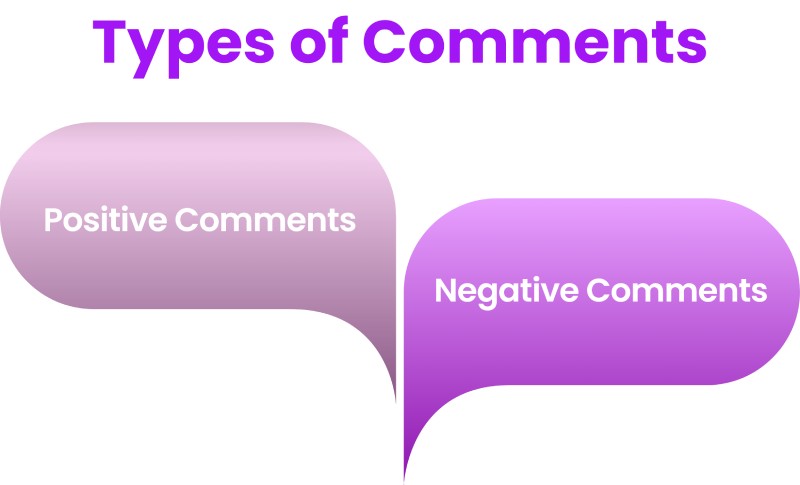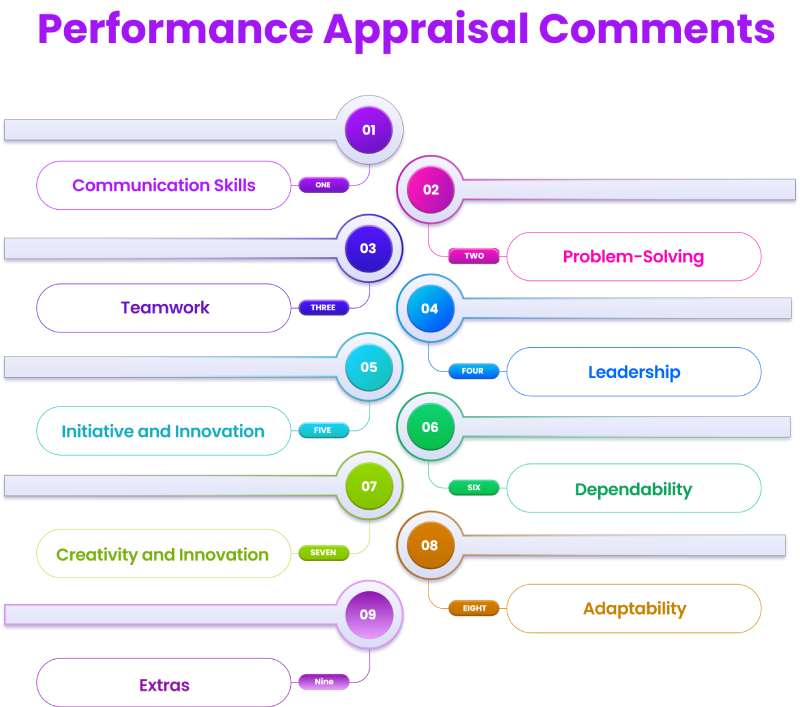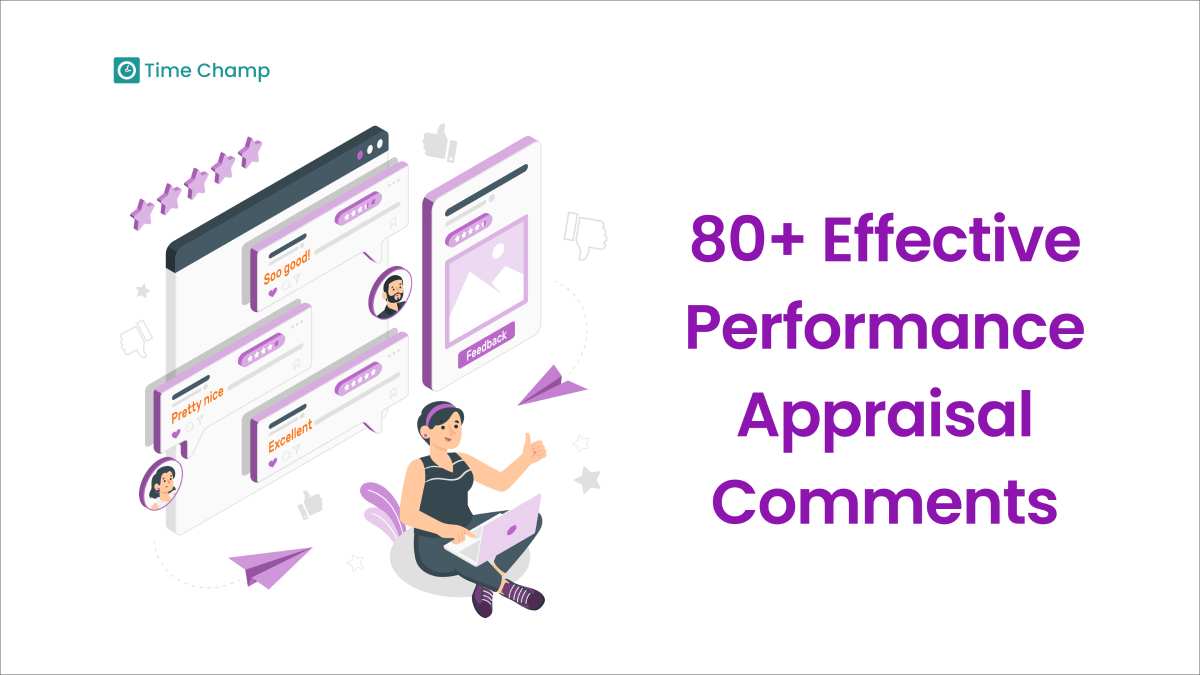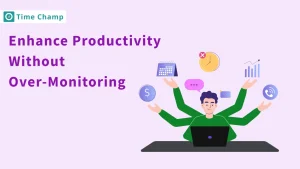Looking for performance appraisal
comments that are easy to adopt and
effective? I got you, let’s dive
straight into the comments no fluff
needed.
But if you want to
know more about performance
appraisals in detail no worries, we
have covered every detail you need
to know just head here.
First
things first, let’s discuss the
types of comments and the do’s and
don’ts so that you can perfectly
apply these performance appraisal
comments without any mistakes
because performance
appraisals are the ones that
can make or break employee
motivation so take care of every
little detail.
Types of Comments

There are mainly two types of performance appraisal comments: positive comments and negative comments.
1. Positive Comments
Positive comments are meant to encourage and reward the efforts and conduct of the employees. They enhance the morale of the employees, encourage them and also recognize their efforts towards the company.
2. Negative Comments
Negative comments address significant issues or shortcomings in an employee’s performance. While these comments highlight areas of poor performance, they should always be coupled with suggestions for improvement to be constructive.
Do’s and Don’t of Performance Appraisal Comments
Many appraisers keep repeating the same mistakes of hurting the feelings of the employees by just overlooking some factors. It’s crucial to maintain employee morale and motivation while offering constructive guidance. Do not be too harsh or too polite, but be honest and give them the information that will help them develop even more in the future.
Do’s
- Be specific and detailed: Ensure that the feedback given is accurate and detailed.
- Focus on behaviour and results: Focus on the things that can be seen and done, as well as the results that can be quantified.
- Use positive language: Give feedback in a positive way that will not demoralize the person.
- Be constructive and developmental: Provide suggestions for enhancement and personal growth.
- Maintain objectivity: Impartially assess performance.
- Ensure clarity and transparency: Make sure that comments are comprehensible and easily understandable.
- Tailor comments to individual needs: Individual feedback should be given according to the employee’s performance profile.
- Encourage dialogue and collaboration: Encourage the free flow of information and teamwork in addressing issues.
Don’ts
- Avoid generalizations: Give constructive feedback that is specific to the performance of the employee.
- Don’t use ambiguous language: Be very clear in your communication so as not to confuse.
- Avoid negativity without solutions: Provide feedback that is positive but specific enough to give the recipient an idea of what they need to do to avoid making the same mistake again.
- Don’t compare employees: Do not compare one employee with another and assess each of them according to his or her performance.
- Don’t ignore positive contributions: Reward and appreciate the efforts and achievements of employees.
- Avoid overloading with feedback: Ensure that feedback is fair and reasonable so that it does not overburden the employees.
- Don’t disregard employee input: Ensure that the appraisal process takes into account the employees’ views and opinions.
- Avoid bias and discrimination: Assess performance fairly without any prejudice or favouritism on grounds of race, color, sex, origin, age, or disability.
Performance Appraisal Comments

I have never wished to be speechless when it comes to assessing a person and I believe you have the same feeling. Here you can find some performance appraisal comments that are most appropriate for the review and use them wherever required.
Communication Skills
Positive
1. Effectively communicates ideas and information.
2. Listens attentively and provides clear feedback.
3. Presents thoughts and opinions clearly in meetings.
4. Writes clearly and concisely in reports and emails.
5. Handles difficult conversations with tact and professionalism.
Negative
6. Lacks ability to express ideas and thoughts to other members of the team.
7. Fails to keep everyone informed of project updates.
8. Provides unclear instructions and feedback.
9. Handles customer inquiries unprofessionally.
10. Has problems with organizing thoughts and presenting them in both spoken and written language.
Did You Know?
Appraisals that are positive and constructive can go a long way in improving the morale of the employees. Employees like to be appreciated and also to be told how they can do better.
Problem-Solving
Positive
11. Identifies problems and finds solutions proactively.
12. Analyzes issues to find root causes.
13. Thinks creatively to solve challenges.
14. Adapts quickly to changing situations.
15. Uses resources efficiently to address problems.
Negative
16. Has trouble identifying the root cause of issues.
17. Lacks the ability to come up with workable solutions to issues.
18. Has difficulty handling unexpected challenges.
19. Fails to use logical thinking to solve complex problems.
20. Finds it challenging to overcome obstacles efficiently.
Teamwork
Positives
21. Collaborates well with team members.
22. Supports colleagues to achieve common goals.
23. Contributes positively to team discussions.
24. Shares knowledge and expertise with others.
25. Builds strong relationships within the team.
Negative
26. Lacks the ability to diagnose the problem.
27. Rarely participates actively in team activities.
28. Does not support team members in their tasks.
29. Discourages a positive team environment.
30. Does not share workload fairly with team members.
Leadership
Positives
31. Sets clear goals and expectations.
32. Assists team members in the completion of their tasks.
33. Delegates tasks effectively.
34. Encourages others to succeed
35. Leads by example and earns respect from colleagues.
Negatives
36. Lacks the ability to motivate others by setting a good example.
37. Lacks the ability to give constructive criticism to other members of the team.
38. Is not able to make good decisions for the team.
39. Discourages team members from developing their skills.
40. Conducts meetings inappropriately and unproductively.
Initiative and Innovation
Positives
41. Takes initiative to improve processes.
42. Generates creative ideas to solve problems.
43. Embraces change and adapts quickly.
44. Actively seeks feedback for improvement.
45. Encourages innovation within the team.
Negatives
46. Avoids seeking out new challenges and opportunities.
47. Rarely brings innovative ideas to the table.
48. Hesitates to take the lead on important projects.
49. Does not look for ways to improve processes.
50. Discourages others from thinking creatively.
Dependability
Positives
51. Consistently meets deadlines.
52. Takes ownership of tasks and projects.
53. Communicates effectively about progress.
54. Responds promptly to requests and inquiries.
55. Shows flexibility in adjusting priorities.
Negatives
56. Is often unreliable and untrustworthy.
57. Fails to complete tasks on time and with quality.
58. Cannot be counted on to meet commitments.
59. Maintains an inconsistent level of performance.
60. Does not respect time and schedules and is always late for deadlines.
Creativity and Innovation
Positives
61. Generates fresh ideas to tackle challenges.
62. Thinks creatively to find new solutions.
63. Encourages innovation among colleagues.
64. Applies creative thinking to projects.
65. Celebrates and recognizes creative contributions.
Negatives
66. Lacks fresh perspectives on projects.
67. Has difficulty in coming up with ideas to solve problems.
68. Discourages others from exploring new ideas.
69. Has difficulty implementing innovative solutions effectively.
70. Rarely seeks to improve and innovate.
Adaptability
Positives
71. Adapts quickly to new situations.
72. Maintains a positive attitude towards change.
73. Adjusts priorities to meet new demands.
74. Embraces new ideas and perspectives.
75. Exhibits capacity to deal with challenges.
Negatives
76. Does not adapt easily to new challenges at the workplace.
77. Does not stay calm under pressure and adapts poorly.
78. Resists new tasks and responsibilities.
79. Fails to adjust strategies as needed to achieve goals.
80. Handles transitions poorly and inefficiently.
Extras
Positive
81. Is a dependable team member that others can rely on.
82. Consistently delivers on promises.
83. Produces work that meets or exceeds standards.
Negative
84. Pays little attention to detail in tasks.
85. Is not a dependable team member.
86. Cannot be trusted with confidential information.
Conclusion
In Conclusion, Performance Appraisals are one of the most effective methods of assessing the performance of employees, giving feedback and planning for future development. The performance appraisal comments discussed here can be employed in your daily language and are simple, straightforward and effective. Make good use of these performance appraisal comments.
If you are looking for self-appraisal comments for your performance review, we have covered that as well you can find them here.
Say Goodbye to Appraisal Hassles!
Achieve hassle-free performance appraisals with Time Champ
Signup for FreeBook Demo





